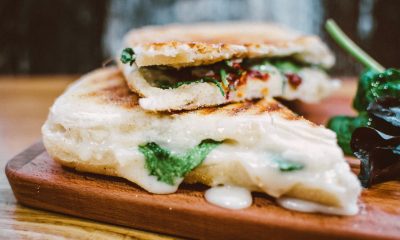Celebs promote booze and junk food to young people on social media
Published
2 years ago onBy
Talker News
By Mark Waghorn via SWNS
Celebrities unwittingly plug booze and junk food to young people on their social media sites, according to new research.
Analysis of nearly 5,200 products from 181 popular stars found almost nine in ten featured unhealthy goods.
Corresponding author Dr. Bradley Turnwald, of the University of Chicago, said they included booze, snacks and candy.
What is more, fewer than five percent had been backed by the manufacturers - showing they played a role in their "everyday lives."
Dr. Turnwald said: "The findings suggest the greater proportion of highly followed celebrity social media accounts depict foods and beverages with an unhealthy profile, primarily in non-sponsored posts."
The study in JAMA Network Open follows warnings from campaigners that celebrity adverts risk 'glamourizing' underage drinking
Last year Rita Ora came under fire for plugging tequila brand Prospero on Instagram.
The Hot Right Now singer, 28, declared it "highlights strong independent women."
Dr. Turnwald and colleagues looked at food and beverage containing posts on the same photo and video-sharing platform.
They followed athletes, actors, actresses, television personalities and music artists.
Dr. Turnwald said: "Celebrity social media posts engage millions of young followers daily.
"But the nutritional quality of foods and beverages in such posts, sponsored and unsponsored, is unknown."
They were rated using the Nutrient Profile Index (NPI) based on sugar, salt, energy, saturated fat, fiber, protein and fruit and vegetable content.
A score of zero indicated least healthy, and 100 most healthy. Foods and beverages under 64 and 70 respectively were classed as "less healthy."
Overall, 158 accounts (87%) earned a less healthy overall food nutrition score and 162 (90%) earned a less healthy overall beverage score.
The latter would be unhealthy enough to fail legal youth advertising limits in the UK.
For foods, posts with healthier nutrition scores were associated with significantly fewer likes and comments from followers.
David Beckham has used Instagram to promote his sponsorship deal with Haig Whiskey.
Singer Nicki Minaj has also used it to plug her MYX fusions red wine blend.
Dr. Turnwald said: "Worldwide, traditional advertisements feature unhealthy foods and often target youths."
Many countries, including the UK, have adopted measures to limit children's and adolescents' exposure to food marketing on television.
Dr. Turnwald said: "However, youths have rapidly migrated from traditional media to social media such as Instagram and Twitter.
"Social media has greater influential potential than traditional media, allowing users to choose targeted content and to interact with posts through liking and commenting.
"Popular brands' social media accounts have capitalized on these features to promote unhealthy foods and beverages to youths online."
Creating the perception users are broadcasting their real life, social media platforms boost the perceived authenticity and credibility of posted content.
Dr. Turnwald said: "Celebrities are particularly influential. On social media, celebrities are perceived as fellow users but also as more credible than ordinary users and more trustworthy than television advertisements.
"Celebrity posts can influence viewers through attitude alignment, social connection and positive meaning transfer from likable people to the foods and beverages they depict."
Junk food advertising on TV before the 9 pm watershed will be banned in the UK by the end of the year.
Paid-for ads on sites including Facebook and Google by big brands will also be outlawed.
Dr. Turnwald said: "Sweet bakery products and alcoholic beverages were the most commonly depicted foods and beverages in social media posts of highly followed celebrities.
"Posting such foods and beverages can shape followers' perceptions of what is normative to consume.
"Moreover, food posts with less healthy nutrition scores were associated with increased likes and comments from followers, indicating greater social approval."
Half of all beverages were alcoholic beverages, as were nearly two-thirds of those in sponsored posts.
The finding is consistent with research on the ease with which youths can access alcohol content on social media, and that posts frequently associate alcohol with positive attributes.
Dr. Turnwald said: "Depicting alcohol as such a large share of beverages matters because social media exposure to alcohol content is associated with alcohol consumption in adolescents and young adults, and these processes are mediated, in part, by perceived norms."
Beverage posts by male celebrities depicted higher alcohol content than those by female peers.
In addition, beverage posts by music artists depicted higher sugar content than those from athletes or actors, actresses and TV personalities.
Most (95.2%) of the celebrity social media posts were not sponsored by food and beverage companies.
Dr. Turnwald said: "They were primarily nonsponsored depictions of the role of foods and beverages in celebrities' everyday lives.
"These results suggest influential depictions of consumption of unhealthy foods and beverages on social media are a sociocultural problem that extends beyond advertisements and sponsorships.
"Celebrities are, of course, entitled to post foods and beverages as they wish on their personal social media.
"They themselves are individuals existing in societies that value and normalize unhealthy consumption, and it is possible social media posts by the general public are similarly unhealthy.
"An association between unhealthy food posts and increased follower engagement, as found in this study, provides a potential incentive to post about unhealthy foods.
"However, given celebrities' broad following, there is potential to shape their followers’ perceptions that healthy eating is normative and valued if celebrities commit to posting a healthier profile of foods and beverages.
"It is also important for followers to remember that social media likely represents a curated, incomplete window into what celebrities actually consume."
He added: "Given celebrities' role model status and broad reach, improvements in the nutritional quality of their social media posts may be a potential opportunity to change the profile of foods and beverages that are perceived as normative and desirable to consume."
Pushed to name some of the celebrities, he added: "I can't call out anyone in particular. I can only talk about the results across the full sample of celebrity athletes, music artists, and actors."
Stories and infographics by ‘Talker Research’ are available to download & ready to use. Stories and videos by ‘Talker News’ are managed by SWNS. To license content for editorial or commercial use and to see the full scope of SWNS content, please email [email protected] or submit an inquiry via our contact form.
You may like


Metals can heal themselves just like ‘The Terminator’


Two-faced star has hydrogen on one side and helium on other


World’s oldest big game hunting weapon found


An espresso a day could keep Alzheimer’s at bay


Being bipolar significantly raises risk of premature death: study


Soccer players who regularly use head more likely to develop Alzheimer’s
Other Stories


Study claims having this type of job can reduce risk of memory issues
A research team measured the degree of cognitive stimulation while working.


Study claims AI better than doctors in accurately assessing eye problems
Are eye doctors going to get replaced by A-eye?


Remains of possibly largest marine reptile ever found on beach by girl
She made the "amazing" discovery while searching for fossils on a beach.


7 out of 10 teens on Twitter get bullied over their weight
Twitch was the second-highest social media platform linked to weight-related bullying.


Early humans used lava cave to shelter from elements 7,000 years ago
They used the shelter from the fierce desert sun.
Top Talkers

 Food & Drink1 week ago
Food & Drink1 week agoWe eat enough grilled cheeses a year to fill 900 Olympic swimming pools

 Broadcast1 week ago
Broadcast1 week agoOver 50% of Americans trust Google more than their schooling

 Animals1 week ago
Animals1 week agoAdorable Australian is a 4-year-old ‘wombat whisperer’

 Broadcast1 week ago
Broadcast1 week agoAmericans eat enough grilled cheeses a year to fill 900 Olympic swimming pools

 Broadcast7 days ago
Broadcast7 days agoGrocery shopping hungry is costing Americans this much
- Broadcast1 week ago
Why 3 in 4 prefer road trips over flying

 Funny6 days ago
Funny6 days agoCops confused by crow mimicking police siren

 Broadcast2 days ago
Broadcast2 days agoOver 40% of Americans have no clue what a 401k is
